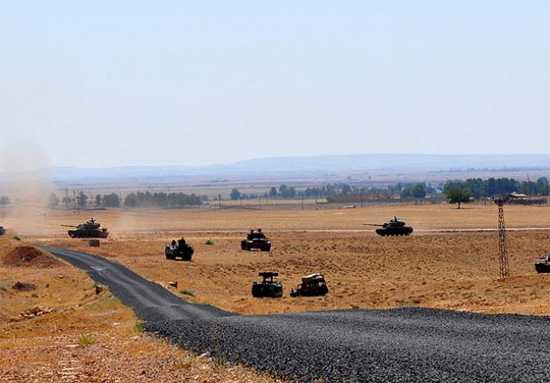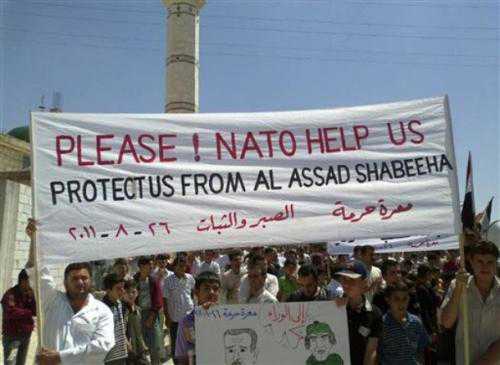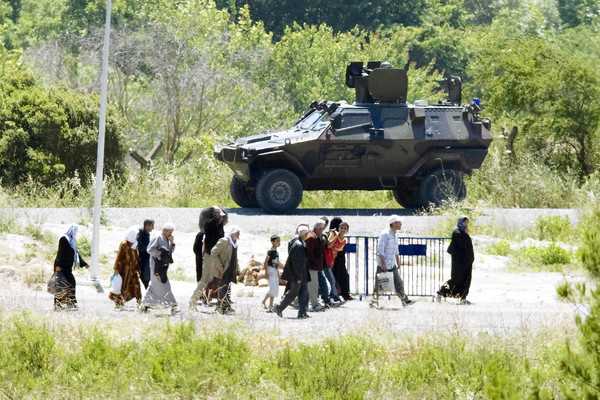Hundreds of Syrian refugees have fled across the border into Turkey to escape the ongoing crackdown on anti-government protests. The influx has added to growing Turkish concerns that the deepening crisis in Syria could lead to the country facing a refugee crisis.
Nearly 250 Syrians recently crossed into Turkey seeking refuge.
Some belong to Syria’s Turkish minority, like this woman:
“My husband and I came because of the situation there,” she said. “Four people were killed in front of his eyes. So we ran away. All our lives are in danger.”
The refugees were housed in an indoor sports stadium, while a tent village was constructed by the Red Crescent Society.
With the crisis in Syria continuing to deepen, Turkish authorities are bracing themselves for more arrivals.
Turkish President Abdullah Gul, speaking on Monday, said Turkey is preparing to deal with a possible influx of refugees, saying authorities are taking measures to be ready for the worst-case scenario.
There are no entry restrictions on Syrians entering Turkey, following last year’s lifting of visa requirements by both countries.
Senior Turkish diplomat Selim Yenel says despite the crisis, there are no plans to suspend the agreement, at least for now.
“No, No, No, we hope this will not be the case, we are not in that situation right now,” said Yenel. “We do hope things will go on peacefully. That we are in close contact with Damascus. We are talking with them. And we are following things very closel, and therefore such a thing to happen.”
But its not only a potential refugee crisis that is causing increasing concern in Ankara. Turkish Prime Minister Recep Tayyip Erdogan voiced his fear of a potential break up of Syria.
“Turkey definitely does not want a separation of Syria, said Prime Minister Erdogan. “And Syria should not allow any attempts that could pave the way for separation.”
Syria, like Turkey, has a restive Kurdish minority. Since 1984, the Turkish-based Kurdish rebel group, the PKK, has been fighting the Turkish state for greater cultural and political rights. According to international relations expert and columnist for a Turkish daily, Soli Ozel, the chaos in Syria offers the PKK a powerful impetus, especially as it has close ties with Syria’s own large Kurdish minority.
“Now a third of the fighters of PKK happened to be from Syria,” said Ozel. “If the country divides along sectarian or ethnic lines, possibility of a Kurdish desire for an independence in the north of Syria obviously is going to throw Turkey off balance.”
Turkey’s 800-kilometer border with Syria runs along its predominantly Kurdish southeast. And most of Syria’s Kurdish minority lives just on the other side of it.
According to analysts, Syrian President Bashir al-Assad has controlled his own Kurdish population with an iron fist. He is widely believed to be playing on Turkish fears that if that fist were relaxed, the Kurds would secede. But Syrian opposition groups are keen to stress that is just scaremongering.
Anas Abdah is head of the international branch of Damascus Declaration, an opposition umbrella group.
“Think this is very important for the Turkish people and Turkish leadership to understand, the fact that the Kurdish element in Syria, which is around 2 million, or about 9 percent of the population is not going to react in a way, which will mean a secession of Syrian land or any kind of problems with the neighbor, either Turkey or Iraq,” said Anas Abdah.
Political scientist Nuray Mert is suspicious of such assurances. She thinks that spreading regional turmoil may offer Kurds across the whole region a unique opportunity.
“Syrian Kurds are against the existing regime, the Iranian Kurds are against Ahmadinejad regime, and they may have some role in regime changes in the region,” said Nuray Mert. “And it empowers the PKK movement and Turkish Kurds’ political movement. Because anyway we have huge problems concerning Kurdish problem in Turkey.”
Observers warn that the prospect of Kurds in neighboring Iran and Syria, freed from oppressive regimes and joining their Iraqi counterparts, who already have substantial autonomy, could rekindle the dream for many Turkish Kurds of an independent state. For Ankara, that would be a nightmare.
via Turkey Worries Syria’s Refugee Influx Could Cause Crisis | Middle East | English VOA






